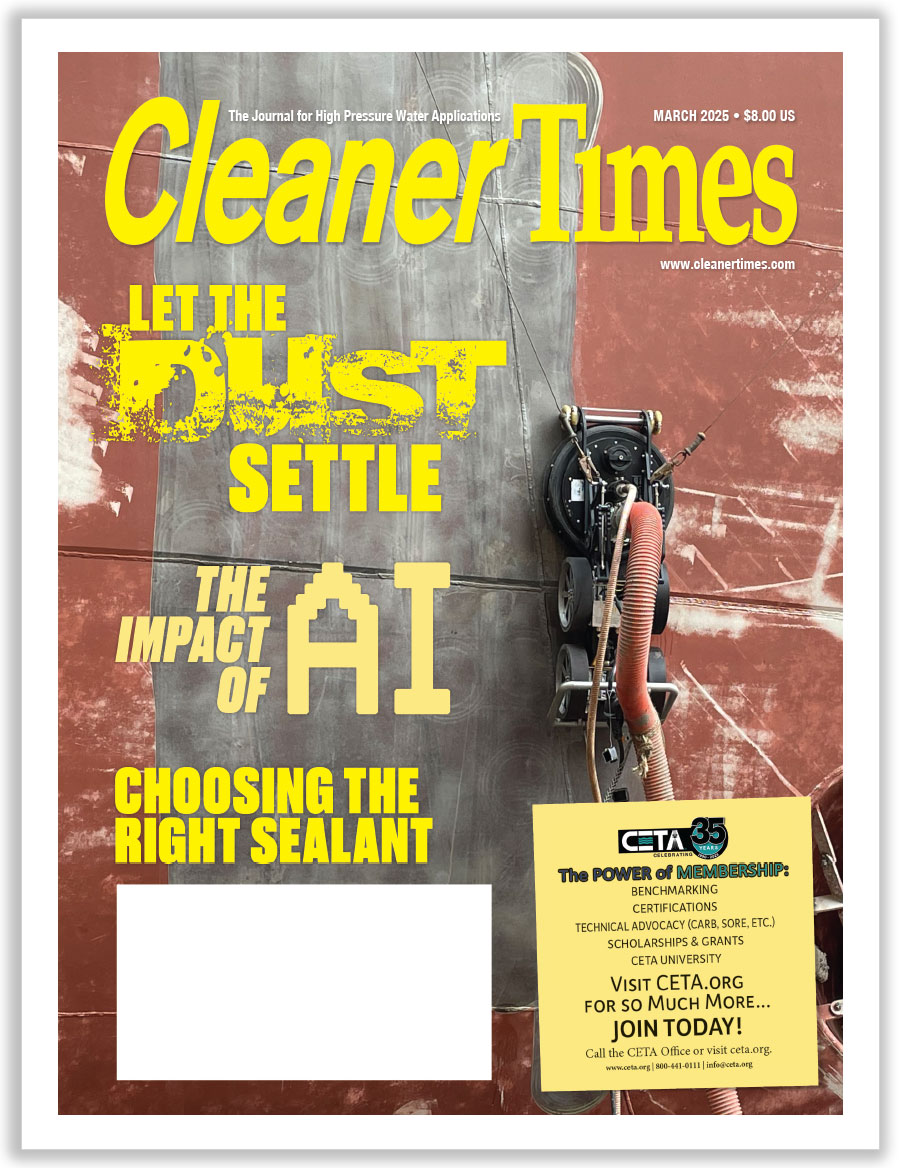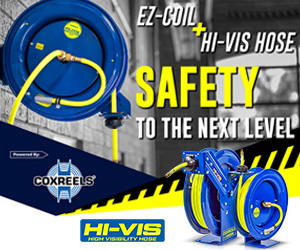
Power Washer’s Guidebook: Oil and Grease Spill Cleanup and Recovery
Contributor: Joel Shorey, President, Wash On Wheels, Englewood, CO / Published November 2013
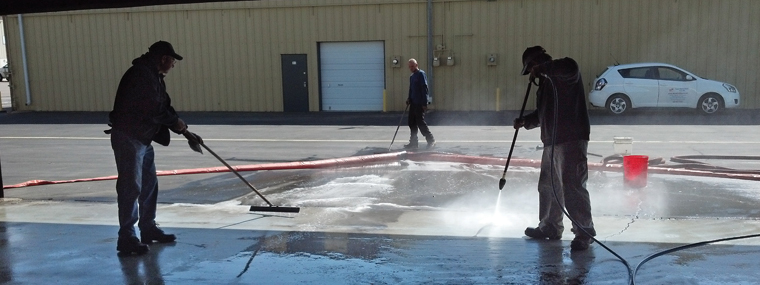
Editor’s Note: This chapter is a new entry in the revision of the 2002 Power Washer’s Guidebook, and oil and grease spill cleanup and recovery is a new focus.
Geographical Considerations
This service would work in any area, but because it is closely tied to water recovery and proper disposal, local environmental regulations must be understood and scrupulously followed.
Typical Job
Oil and/or grease spill cleanup entails many different substances. The proper disposal of the wastewater dictates how the job should be approached.
[Notes: Regulations for disposal of wastewater vary with locality. Know the regulations (local, state, and federal) that apply and meet them. (For a good review of expectations and complexity, see the July 2013 issue of Cleaner Times | IWA, “Discharge of wastewater…” by Robert M. Hinderliter.) Do not venture into areas that require hazardous material (hazmat) certification without the certification.]
Restaurants are the sites of many grease and oil spills. In most areas of the country, when cleaning a grease spill at a restaurant, wastewater may be collected, filtered to meet local standards, and then pumped back into the grease trap at that restaurant.
There are two types of food grease spills at restaurants. One is from fryer oil being spilled, and the other is from the grease trap backing up. Both can quickly cover large areas, especially if cars drive through and track the grease. (We have had calls to clean the underside of cars that drove through a greasy area. Old food grease can really stink when it is hot, and the odor can linger for weeks.)
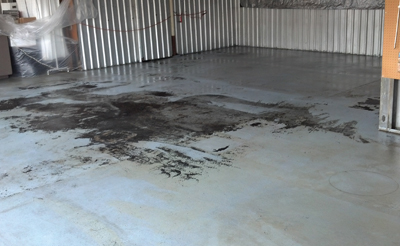 All restaurants have grease traps in their sanitary sewer system to catch the grease and prevent it from flowing into the main sanitary sewer lines where it may clog pipes. Grease traps must be pumped out when they get full. In some instances, the grease trap backs up and overflows into the parking lot. When tackling such cleanup, make sure a pumper truck is called to be present during cleanup so the source of the spill is contained and there is somewhere to dump wastewater.
All restaurants have grease traps in their sanitary sewer system to catch the grease and prevent it from flowing into the main sanitary sewer lines where it may clog pipes. Grease traps must be pumped out when they get full. In some instances, the grease trap backs up and overflows into the parking lot. When tackling such cleanup, make sure a pumper truck is called to be present during cleanup so the source of the spill is contained and there is somewhere to dump wastewater.
Restaurant fryer oil is dumped into a container to be recycled. The grease is usually carried from the kitchen in buckets that can drip on the way to the recycle container. Fryer oil may be spilled while being dumped into the container, which is usually kept out in the trash enclosure. (A shopping center’s trash enclosure may be shared by several businesses, it may be neglected—no one claims responsibility—and it is generally a nasty environment.)
The company that recycles fryer oil sometimes spills oil when dumping the consolidated collection container into their truck. Such spills often consist of many gallons of dirty, foul-smelling fryer oil.
Motor oil or hydraulic oil spills require special attention to disposal of wastewater. For example, depending upon the amount of oil in wastewater, it may be necessary to take all of the water/oil mixture to an EPA certified disposal company or waste site.
In some regions, an oil-water separator will suffice prior to disposal of the wastewater in the same manner as if no oil were involved. (Unless there is standing oil, the separator generally captures less than a tablespoon of oil since most of the oil will already have soaked into the asphalt or concrete.) If there is a large volume of oil to be collected, the cleanup may need to be done by a hazmat-certified company.
Techniques that Work Best
The first consideration in all oil and grease spill cleanups is the method for capture and disposal of wastewater. We run the water through a grease sock before it gets collected, then run it through filters and an oil water separator. (Food grease being pumped back into a restaurant grease trap need not pass through a separator, which it may clog.)
Our recovery unit includes an oil/water separator and extra filtration to remove the solids and oils, so the remaining wastewater can be disposed of in a more conventional manner. Sometimes a grease spill will require a degreaser to be applied then scrubbed with a brush to loosen the grease. Follow all instructions for use and proper disposal of degreaser.
Exceptions
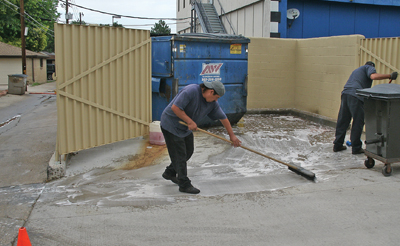 If grease is extra thick, such as a trash enclosure behind a restaurant that has not been maintained, the area may have to be cleaned two or three times, working down through the layers of grease. Long-ignored grease may become sunbaked and so tough that complete removal is almost impossible.
If grease is extra thick, such as a trash enclosure behind a restaurant that has not been maintained, the area may have to be cleaned two or three times, working down through the layers of grease. Long-ignored grease may become sunbaked and so tough that complete removal is almost impossible.
Turbo tips and straight tips might be used if the sub-surface is hard enough. Make sure the client does not expect perfection. Most oils quickly soak into the concrete or asphalt, and it is difficult to make it look as though the spill never happened. If called by the client within hours and it is possible to be on site very soon after that, the odds of restoring to pre-spill appearance are higher.
Equipment and Supplies
A recovery unit with a tank large enough to haul the wastewater and oil is essential. A recovery unit with a filtration system that puts filtered water back in the wash tank will not work.
Most spills can be handled with a 300-gallon recovery tank. This is best done with a separate trailer to convey the recovery unit. We pull our recovery trailers behind a truck that hauls the wash units.
Dams and drain blockers are necessary, as they are with other recovery jobs. In addition, oil and grease clean-up jobs require grease socks and possibly an oil-water separator and extra filtration for the recovery units.
How to Bill
The best way to bill is by the hour plus materials including degreaser, grease socks, and filters. With experience, it may be possible to offer a comprehensive price or bid, but given the variables, hourly rate plus materials is preferred. Charge extra for emergencies that require a schedule change.
If the client needs a total dollar figure before approval, consider giving a ‘not to exceed’ number that will cover all possible problems. Be wary of firm quotes, which can result in completing the job at a loss.
When asked to clean a site that involves multiple clients, be sure to determine who is paying the bill. For instance, a restaurant and recycle company may disagree over which is responsible for a spill or plan to split the bill. Aim for a single contact and payer before beginning work to avoid being caught between parties in disagreement.
The need to use an EPA-certified disposal site dramatically increases the costs of doing the job. The cost for disposal of the wastewater at such a site can be more than $1/gallon, which makes the job much more expensive. Add this cost and the cost of hauling the waste to the disposal site to the estimate.
Larger municipalities often have hazardous material clean-up companies with the facilities in place to dispose of motor oil and hydraulic fluid. It is difficult to compete with them on estimates.
Ancillaries
For restaurants or shopping centers, selling maintenance cleaning on a weekly, monthly, or quarterly schedule is good for the client and the contractor.
Problem Areas to Avoid
Two main things can go wrong. If expectations are set too high, the client may be disappointed with results. And if wastewater is not properly collected and some reaches a storm drain, fines (client and contractor) may result. Be proactive by protecting storm drains.
Finally, always evaluate the substrate before beginning. Since asphalt is oil based, oil spills tend to blend quickly with sub-surface. If left too long, the asphalt can soften to the point where pressure washing will tear it up. Removing the sheen and loose oil on top becomes difficult without making the asphalt look worse than when the job was started.
How to Fix Mistakes
When possible, establish a relationship with clients through regular maintenance contracts. Regularly scheduled grease and oil cleanup makes client sites more attractive and reduces the likelihood of substrate degradation.
Joel Shorey is President of Wash On Wheels, the largest pressure-washing company in Colorado. Established in 1985, Wash On Wheels has earned an A+ rating with the Denver/Boulder BBB. The company specializes in oil/grease spill cleanups and wastewater recovery.

